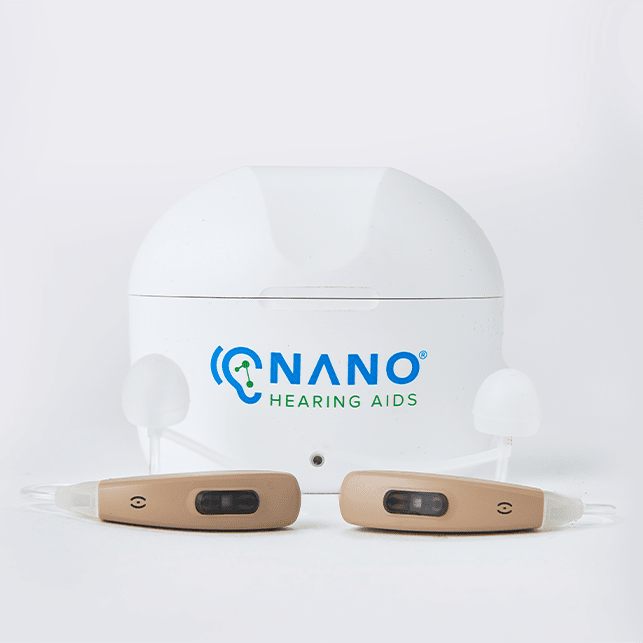Key Takeaways
What is High-Frequency Hearing Loss?
Imagine you're trying to listen to your favorite song, but no matter how high you turn up the volume, the melody isn't quite right. The high notes, once crystal clear, now seem muffled or absent. This is a glimpse into what high-frequency hearing loss can feel like. It's a condition where your ears lose the ability to pick up sounds at higher pitches, such as the consonant sounds of speech, impacting the understanding of speech and environmental sounds.
Degrees of high-frequency hearing loss:
NANO Hearing Aids are FDA-registered, Class I devices. Our OTC hearing aids are designed for individuals over 18 years of age with perceived mild to moderate hearing impairment. With prices starting at just $297, they offer a viable solution for those looking to improve their hearing without breaking the bank.
Causes of High-Frequency Hearing Loss
Symptoms of High-Frequency Hearing Loss
Recognizing the symptoms of high-frequency hearing loss is essential for early intervention. Because this type of hearing loss often develops gradually, it can be easy to miss the initial signs.
Look out for these indicators:
Diagnosing High-Frequency Hearing Loss
The diagnostic process for high-frequency hearing loss begins with a comprehensive hearing assessment conducted by a hearing professional. This evaluation often involves a physical inspection of the ears followed by various hearing tests, including audiometry, which helps determine the specific nature and extent of the hearing loss.
Treatment Options for High-Frequency Hearing Loss
Hearing Aids: Types and Effectiveness
Hearing aids are often the first line of treatment for high-frequency hearing loss. They're designed to amplify the volume and clarity of the sounds you struggle to hear.
Modern hearing aids come with features like digital noise reduction, directional microphones, and frequency compression, which can make a significant difference for high-frequency sounds. When choosing a hearing aid, it's important to consider:

Cochlear Implants and Severe High-Frequency Loss
For those with severe high-frequency hearing loss, cochlear implants may be recommended. Unlike hearing aids that amplify sounds, cochlear implants bypass the damaged part of the ear and directly stimulate the auditory nerve.
Cochlear implants can be life-changing, especially for individuals who find little benefit from traditional hearing aids. The decision to get a cochlear implant involves careful consideration and consultation with medical professionals, but the potential to restore a significant level of hearing is an exciting prospect.
Assistive Listening Devices and How They Can Help
Beyond hearing aids and cochlear implants, there are assistive listening devices (ALDs) that can enhance hearing in specific situations. These devices include:
Therapeutic Interventions and Communication Strategies
Therapeutic interventions like auditory training can help you make the most of your residual hearing. These strategies teach you to recognize sounds and understand speech without relying solely on volume. Speechreading and communication tactics, such as choosing optimal seating in a restaurant or reducing background noise at home, can also enhance your ability to communicate effectively.
Living with High-Frequency Hearing Loss
To enhance communication effectiveness despite hearing loss, it is essential to keep friends and family informed about your condition, enabling them to adapt their communication methods accordingly.
Additionally, leveraging visual cues and the context of conversations can help compensate for any missed parts. Maintaining a proactive approach to your hearing health through updates on hearing aids or ALDs is also crucial for managing your hearing loss effectively.
Remember, you're not alone in this journey. There's a community and professionals ready to support you every step of the way.

Can High-Frequency Hearing Loss be Prevented?
Preventing high-frequency hearing loss is not always possible, especially when it comes to factors like aging and genetics. However, there are preventive measures you can take to protect your hearing from noise-induced damage, which is a common cause of high-frequency hearing loss. Here's what you can do:
Nano OTC Hearing Aids for Perceived Mild to Moderate Hearing Loss

Nano First Ear CIC Hearing Aids
Over-the-counter (OTC) hearing aids, such as those we offer at Nano Hearing Aids, can be a viable solution for individuals with perceived mild to moderate hearing loss.
Our OTC hearing aids are known for their affordability and ease of use, with our basic CIC models starting at $297. With Nano OTC hearing aids, you can choose the most comfortable dome size for your ears. For example, our new completely-in-canal model, First Ear Pro CIC, comes with customizable ear tips, ensuring a comfortable and discreet fit.
If you want to find out more about our products and insurance coverage, or need help choosing the right model for your needs, call us at (888) 310-6266!
Frequently Asked Questions (FAQ)
Can OTC hearing aids help with high-frequency hearing loss?
Yes, OTC hearing aids can help with high-frequency hearing loss, which involves difficulty hearing sounds at higher pitches. These devices can amplify specific frequencies, including high ones, to improve speech clarity and listening experience.
Can high-frequency hearing loss get worse?
Yes, without proper intervention and protection, high-frequency hearing loss can worsen over time, especially if it's caused by ongoing exposure to loud noise.
Are there specific jobs that put me at risk for high-frequency hearing loss?
Occupations with consistent exposure to loud noises, such as construction, music, and manufacturing, can increase the risk of developing high-frequency hearing loss.
Is high-frequency hearing loss covered by insurance plans?
Coverage for high-frequency hearing loss treatment, including hearing aids or other therapeutic interventions, varies significantly by insurance plan and location. In many cases, traditional health insurance plans might not cover hearing aids, which are a common treatment for high-frequency hearing loss. However, some plans may offer partial coverage, discounts, or coverage through additional special programs or riders.



